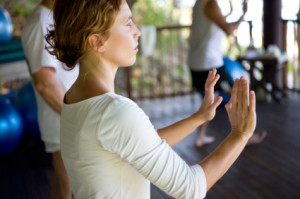By Jorga Houy, LAc, Emperor’s College Alumnus and Owner of LA Sports Acupuncture
When you go to your acupuncturist, you’re going to hear about “Qi.” Your acupuncturist may say that your Qi is “deficient” or “stagnant” or even “exuberant” or “rebellious.” This may leave you wondering what exactly they’re talking about. What is Qi exactly?
Qi, pronounced “chee,” really refers to a lot of things depending on the context. In a very grand sense, everything is Qi, the space around us, the earth, and everything in between is a temporary manifestation of Qi swirling about; every identifiable thing is simply a transient concentration of Qi.
This blog post is part of our AOM Day Series on Qi. Get more here:
What is Qi? It’s embracing the idea of movement
The Chinese character for Qi describes the steam rising up from cooked grains: so inherent in the concept of Qi are ideas such as movement and a progressive, rhythmic, transformative process. Following that idea, the regular progression of the seasons is a type of Qi; the process of gradual warming from winter through spring and into summer is a type of Qi.
Additionally, the specific character of each season itself is a type of Qi: the Qi of summer would be hot and dry in some climates and hot and humid in others. This same idea of character can also extend to a given mood, either one’s own mood or emotional state, or the overall mood of a gathering of people would be described as a type of Qi.
What is Qi? It’s the connection between us and our environment
 In a more physical sense, in our own bodies, our cardiopulmonary rhythm is a type of Qi. In Chinese medicine, the electric pumping activity of the heart and the rhythm of our breath are described as a specific type of Qi called “Zong Qi”. When we combine the concept of Qi as a biological force and the idea of Qi as a force of nature, we can see how our environment, our mood, and our physical capacities interrelate and determine our overall health.
In a more physical sense, in our own bodies, our cardiopulmonary rhythm is a type of Qi. In Chinese medicine, the electric pumping activity of the heart and the rhythm of our breath are described as a specific type of Qi called “Zong Qi”. When we combine the concept of Qi as a biological force and the idea of Qi as a force of nature, we can see how our environment, our mood, and our physical capacities interrelate and determine our overall health.
As we are a part of the world around us, the Qi of our environment affects our individual Qi; for example, bright and happy colors and fresh air tend to promote a positive mood, whereas gloomy surroundings tend to lead to similarly gloomy moods. This is one of the principles used in the Chinese art of Feng Shui, a practice of arranging the environment of one’s home so that the Qi flow is maximized in the most harmonious way possible.
What is Qi? It’s the force that moves things through our body
Over millennia in China, doctors, scientists, monks, and philosophers discovered the patterns in which Qi moves in the body, its rhythms and flow. Over time, they identified a system of Qi flow they called “Mai” which is commonly translated as “meridians” or “channels.” Fitting in with the Chinese naturalistic philosophy, the language used to describe the flow of Qi in the meridians is like that used to describe water, it “pools” and it can “stagnate.”
Along these meridians, they found that the Qi pools at predictable locations, which are where your acupuncturist places the acupuncture needles. By subtly manipulating the needle, your acupuncturist is able to affect the Qi flow. Your acupuncturist may be stimulating the flow of Qi where it has become stuck or stagnant, or they may be redirecting it if it is flowing the wrong way; one example of Qi flowing the wrong way would be a complaint of frequent belching or gastric reflux, where instead of moving downward as it is supposed to, the Qi of your stomach is moving upward (known as “stomach qi rebellion” in Chinese medicine).
What is Qi? It’s something we can exercise
Another way your acupuncturist may help your Qi move in a smooth, harmonious way is by teaching you certain Qi Gong exercises. Qi Gong is a system of exercise, where breathing is combined with movements and mindful attention, a kind of moving meditation. Tai Chi is one popular form of Qi Gong. By moving slowly and intentionally with smooth breathing and visualization, we can stabilize our moods, move our joints through their full ranges of motion, and stimulate the body’s ability to heal itself. Over time, and with regular practice, Qi Gong can be a valuable aid in promoting long life and lasting, radiant health.
Easy Qi Gong Exercise for Calming Stress
Try this simple Qi Gong exercise to de-stress. This exercise can be done seated or standing.
- If standing, stand with feet shoulder width apart and knees comfortably bent; if seated, sit at the edge of your chair, and sit up straight with the feet separated and flat on the floor.
- Touch the tip of your tongue to the roof of your mouth, your teeth should be apart (not clenched). This unlocks the muscles in your jaw and sends a signal to your nervous system that it’s time to relax.
- Close your eyes. If you are standing, let your arms hang loosely at your sides. If you are seated, place your hands palm-up on your thighs.
- Breathing through your nose, take three deep and slow breaths from your diaphragm inhaling fully. With each exhale imagine you are breathing your stress away.
- Open your eyes. Take a deep breath and as you inhale bring your arms up in a big arching circle until they are stretched up straight above your head and your palms are touching. As you do this, look up at your hands.
- Exhale and bring your hands down in front of you with your palms facing down as if you were pushing a piece of wood into the water. Again, imagine you are exhaling your stress away.
- Repeat this movement three times.
- Rub your palms together until they are warm, and then place your warmed palms over your closed eyes for a few moments.
- Return to your day refreshed and de-stressed.
Now that you know what your Qi is, you can use it to stay healthy and stress free. Now go out there and share the Qi!
Jorga Houy, LAc, is an acupuncturist specializing in orthopedics, sports medicine, and pain management. Jorga received his master’s degree from Emperor’s College of Traditional Oriental Medicine in Santa Monica, California. In addition to running his own private practice clinic, he is a staff acupuncturist for the LA Derby Dolls, and a faculty member of Matrix International University. www.lasportsacupuncture.com


